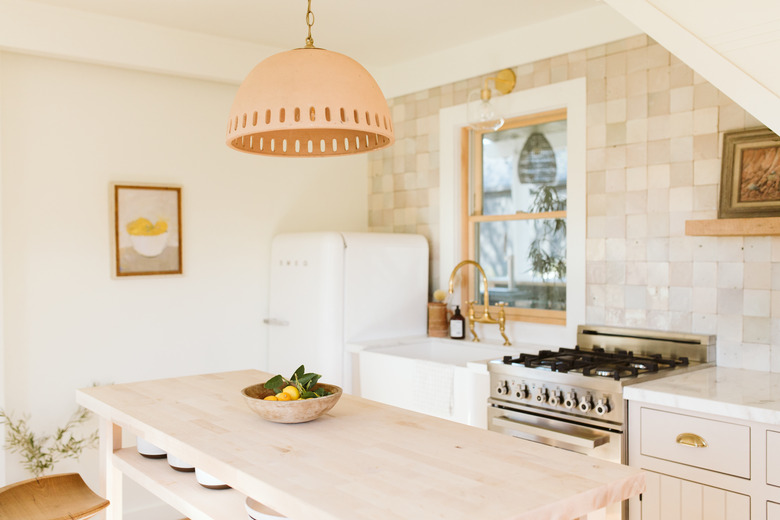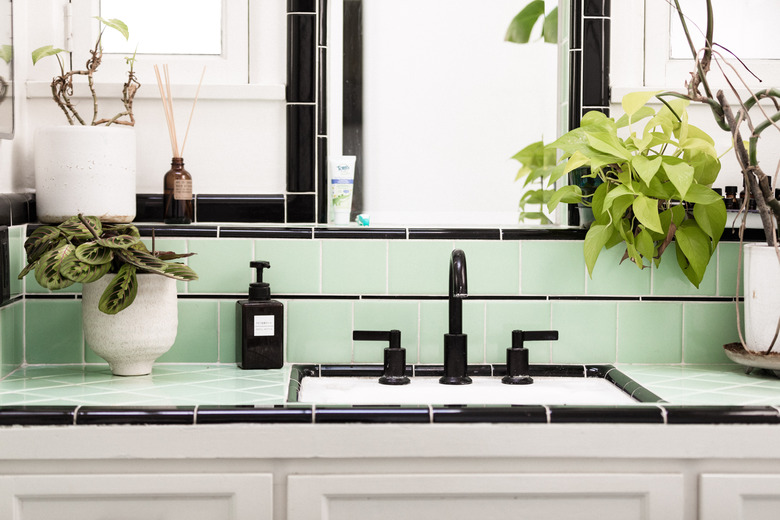Feng Shui Kitchen Tips
The ancient Chinese art of feng shui seeks to optimize the flow of energy, or ch'i, throughout the house to create a harmonious space that aligns with the lives of the people that occupy the house. When applying basic feng shui principles to the kitchen, it's important to keep its function in mind, because that's one of the main determinants of appropriate room design. Together with the bathroom and bedroom, the kitchen is one of the three most important rooms in the house. It's where you go to nourish the body.
Balancing the five elements is central to proper application of feng shui to any room in the house. Because of the presence of the stove and sink, the elements of fire and water are well represented in the kitchen, and metal and earth are usually also present. The one element usually lacking is wood, and there are several ways to introduce it. You want to avoid a preponderance of any element, but particularly fire, because too much of that element can cause unrest in the household and frequent arguments.
To ensure the free flow of ch'i, it's as important to control clutter in the kitchen as it is in every other room. Kitchens are also prone to sharp edges and pointed objects, which become "poison arrows," and make people feel uncomfortable and are best avoided. Here are 12 more tips to help create a life-affirming and efficient kitchen that can bring wealth and prosperity into your life.
Tip #1: Paint with Light Colors
Tip #1: Paint with Light Colors
Earth tones, such as beige, gold and soft yellow, are great kitchen colors because the fire element, which is epitomized by the stove, feeds earth. In a kitchen with more than its share of fire—for example, one with more than one stove or one in the south part of the house—light blue, the water color, is a good moderating influence.
The kitchen should be light and airy, so avoid dark colors, especially dark blue and black. They are water colors and, together with the faucets and icemaker, quickly make that element overbearing. Of course, the kitchen colors have to blend with those in the rest of the house, and a nod toward the bagua, or directionality of the house, is in order when choosing them.
Tip #2: Bring in the Wood Element
Tip #2: Bring in the Wood Element
The wood element is often lacking in a kitchen, and painting the walls light green or installing wood cabinets are good ways to introduce it. Other ways you can bring in the wood element include placing a few green plants and setting a wooden fruit bowl on the counter. You can also place a wooden table and chair set or a tall wooden cabinet, because columnar shapes evoke wood.
Tip #3: Avoid Open Shelving
Tip #3: Avoid Open Shelving
Feng shui consultants generally frown on open shelves in the kitchen, because they contribute to clutter. Food items, dishes, utensils and cooking implements should all be stowed in drawers or behind cabinet doors.
Inside the cabinets, keep similar things together to create order. Put plates in one place and cups in another; canned foods in one cabinet and food in bags in another; sweet spices in one part of the spice cabinet and savory spices in another.
Tip #4: Keep the Stove Clean and Well Maintained
Tip #4: Keep the Stove Clean and Well Maintained
As the most important appliance in the kitchen and the traditional symbol of wealth in feng shui, the stove deserves special respect. Clean the burners and the oven carefully after every use, and promptly repair any burner that goes on the fritz. Every part of the stove should be in good working order, including the lights, the clock and the vent hood.
Tip #5: Don't Put the Microwave Over the Stove
Tip #5: Don't Put the Microwave Over the Stove
Because the stove is such an important part of the kitchen, it should have plenty of space above it. Many homeowners try to save valuable counter space by installing the microwave directly above the stove, but this creates two problems. The first is that crowding the stove, which is a symbol of wealth, prevents prosperity from coming into your life. The second is that placing two cooking implements so close together concentrates too much fire in a single part of the kitchen.
Tip #6: Balance the Elements with Art and Furniture
Tip #6: Balance the Elements with Art and Furniture
Every kitchen has one or more cooking appliances to represent fire; a faucet, dishwasher and refrigerator to represent water; and metal enclosures on all the appliances. If you leave out the stabilizing influence of earth and the vitality of wood, the kitchen will lack soul and become institutional. Bring in earth and wood with color, artwork, and furniture. One or more of the elements can predominate, depending on the bagua of the house, but all should be represented.
Tip #7: Cover the Entrance if It Faces the Bathroom or a Bedroom
Tip #7: Cover the Entrance if It Faces the Bathroom or a Bedroom
The kitchen is the room for creativity and nutrition, while the bathroom is the room for elimination. If the doors between these rooms face each other, and you leave them open, you might end up feeling slightly nauseous in the kitchen. Similarly, the bedroom should be a restful place, but it won't be if the door opens directly into the kitchen. If you can't close the doors, keep them covered with a hanging cloth or a screen.
Tip #8: Separate the Stove and Sink
Tip #8: Separate the Stove and Sink
Fire and water work against each other, and when the sink and stove are too close together, a pattern of confrontation may result. If you can't move the stove to another part of the kitchen, which is the best option, a simple solution is to hang some green dish towels between them. Green is the color of wood, and water feeds wood while wood feeds fire, so the towels intervene in the destructive relationship between fire and water.
Tip #9: Provide Layered Lighting
Tip #9: Provide Layered Lighting
You need plenty of light in the kitchen. One or two area lights provide general illumination, and these should preferably not be fluorescents, which create disturbing vibrations in the visual field. You also need more focused lighting for eating areas and work lights for the stove, sink and countertops.
During the day, rely on natural lighting through the windows as much as possible. Keep the windows open whenever possible to keep air circulating, which helps keep odors under control.
Tip #10: Keep Everything in Good Working Order
Tip #10: Keep Everything in Good Working Order
All the major appliances, as well as the small ones, should be working properly to support the kitchen's role in creating wealth and prosperity in your life. Make sure the cabinet doors open and close properly and that the knives are sharp. Toss out any cracked bowls or plates, repair defects in the countertops and touch up any paint chips on the appliances of the walls.
Tip #11: Store Knives Out of Sight
Tip #11: Store Knives Out of Sight
Knives left sitting on the counter or hanging on the wall create an unsettling feeling for anyone working the kitchen. Stowing them in a wood block with their handles pointed toward the room isn't ideal, but it's better than having the sharp tips and points visible or worse, pointing in your direction when you're cooking. Keeping them in a dedicated drawer is the best option.
Tip #12: Fix that Leaky Faucet
Tip #12: Fix that Leaky Faucet
The kitchen faucet holds back precious water until you're ready to use it, and when it leaks, you waste the water that goes down the drain, and some of your life energy goes with it. It's usually fairly easy to fix a dripping faucet, and it's something you should do promptly to keep ch'i flowing in a positive and productive way in the kitchen.
References
- Open Spaces Feng Shui: Top-Ten Feng Shui Kitchen Makeover Tips
- Feng Shui Nexus: 33 Kitchen Feng Shui Rules and Tips – Location, Stove, and Basics
- My Domaine: I'm a Feng Shui Expert—These Are the Only Colors I Would Paint My Kitchen
- Realtor.com: A Recipe for Misfortune? 7 Feng Shui Mistakes to Avoid in the Kitchen
- Homedit: Feng Shui Your Kitchen: Tips for Optimizing Positive Energy in the Heart of the Home

